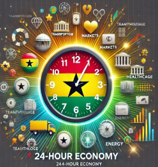Technology is a key enabler of economic transformation, particularly in facilitating the shift toward a 24-hour economy. In Ghana, the integration of digital infrastructure, automation, and artificial intelligence (AI) is reshaping industries and increasing productivity.
The rise of mobile money, e-commerce, smart logistics, and digital banking has made it possible for businesses to operate beyond conventional working hours (World Bank, 2023).
According to the Ghana Statistical Service (2023), digital transactions have increased by 65% over the past five years, illustrating the growing reliance on technology for economic activities.
A 24-hour economy relies heavily on technology to ensure seamless business operations, financial transactions, and service delivery. “Technology is the great enabler that turns economic potential into prosperity” (Schwab, 2016).
As Ghana advances toward an all-day economic model, investments in digital infrastructure, cybersecurity, and automation will be crucial.
This article examines how technology is shaping Ghana’s 24-hour economy, its impact on various sectors, challenges, and strategic policy recommendations for sustainable technological advancement.
THE ROLE OF TECHNOLOGY IN A 24-HOUR ECONOMY
- Digital financial services and cashless transactions
The expansion of mobile money services and digital banking is a cornerstone of Ghana’s technological revolution. The Bank of Ghana (2023) reports that mobile money transactions reached GHS 1.5 trillion in 2023, reflecting an increasing preference for cashless payments.
This financial inclusion enables businesses to operate round the clock without relying on physical banking services. FinTech companies such as Zeepay, ExpressPay, and MTN MoMo have played a significant role in enhancing financial accessibility and supporting Ghana’s transition to a 24-hour economy.
- E-Commerce and online marketplaces
E-commerce platforms such as Jumia, Tonaton, and Glovo have transformed the retail industry, allowing businesses to operate beyond traditional hours.
The growth of online shopping and food delivery services has created new opportunities for employment and economic expansion. A study by the International Finance Corporation (IFC, 2023) reveals that e-commerce contributes 12% to Ghana’s GDP and is projected to grow by 20% annually.
- Smart logistics and supply chain optimization
Technology-driven logistics companies like Bolt Food and Yango have enhanced efficiency in the transportation of goods and services. Automated tracking systems, real-time inventory management, and artificial intelligence (AI) in supply chain operations reduce downtime and increase service availability.
Countries such as China and the United States have leveraged smart logistics to sustain 24-hour economies, a model Ghana can replicate (OECD, 2023).
- Digital workspaces and remote employment
The adoption of digital communication tools such as Zoom, Microsoft Teams, and Google Workspace has enabled businesses to function beyond traditional office hours. Remote work allows companies to expand their workforce, operate across different time zones, and enhance productivity.
According to the Ghana Digital Economy Report (2023), 35% of professionals in Ghana now engage in remote work, contributing to a more flexible and efficient economy.
- Artificial Intelligence (AI) and automation
AI and automation are revolutionizing industries such as healthcare, agriculture, and manufacturing. Smart farming technologies, robotic automation in production, and AI-driven customer service improve efficiency and minimize human errors.
The Ghana Investment Promotion Centre (GIPC, 2023) identifies AI adoption as a critical driver of the country’s economic growth and competitiveness.
CHALLENGES OF TECHNOLOGY IN A 24-HOUR ECONOMY
Despite the benefits, Ghana faces several challenges in leveraging technology for a 24-hour economy:
- Digital divide: Unequal access to technology between urban and rural areas hinders nationwide adoption.
- Cybersecurity risks: Increased digital transactions expose businesses and consumers to fraud and cyber threats.
- Infrastructure deficiency: Unreliable internet connectivity and inconsistent power supply disrupt technological operations.
- High cost of technology adoption: Many SMEs struggle with the financial burden of investing in digital solutions.
- Regulatory and policy gaps: The absence of comprehensive legal frameworks for digital businesses slows innovation.
POLICY RECOMMENDATIONS FOR TECHNOLOGICAL ADVANCEMENT
To ensure technology effectively drives Ghana’s 24-hour economy, the following policy actions should be prioritized:
- Expand digital infrastructure: Increase investments in broadband internet, 5G networks, and stable electricity supply.
- Enhance cybersecurity measures: Implement stronger cybersecurity regulations and consumer protection policies.
- Support tech-based startups: Provide financial incentives, tax reliefs, and funding opportunities for technology-driven businesses.
- Promote digital literacy: Introduce tech-focused education and training programs to equip the workforce with relevant skills.
- Strengthen Public-Private Partnerships: Collaborate with global tech companies to drive innovation and digital transformation.
CONCLUSION
Technology is the engine powering Ghana’s transition to a 24-hour economy. From digital payments to e-commerce, smart logistics, and AI-driven automation, technological advancements are reshaping industries and improving economic efficiency.
However, addressing challenges such as infrastructure deficits, cybersecurity threats, and the digital divide is essential for sustainable growth. With the right policies and investments, Ghana can fully harness technology to achieve a thriving, round-the-clock economy
REFERENCES
- Bank of Ghana. (2023). Annual Report on Digital Transactions and Financial Inclusion. Accra, Ghana.
- Ghana Digital Economy Report. (2023). The State of Digital Transformation in Ghana. Ministry of Communication and Digitalization.
- Ghana Statistical Service. (2023). Digital Transactions and Economic Growth. Accra, Ghana.
- International Finance Corporation. (2023). E-commerce and MSME Growth in Emerging Markets. Washington, D.C.
- Organisation for Economic Co-operation and Development (OECD). (2023). Technological Innovation and Economic Growth. Paris, France.
- Schwab, K. (2016). The Fourth Industrial Revolution. World Economic Forum.
- Ghana Investment Promotion Centre (GIPC). (2023). AI and Automation: The Future of Ghana’s Economy. Accra, Ghana.
- World Bank. (2023). The Digital Economy and Its Impact on Emerging Markets. Washington, D.C.

CORPORATE DOCTOR
The writer is a distinguished Ghanaian traditional scholar with over three decades of professional experience with a diverse portfolio in Academic, Regional Integration, Public Policy, Sustainable Entrepreneurship Development, Human Resource Management, Organizational Development, Leadership, Governance, Democracy, Culture and Tradition. Dr. Adoofi serves as the Manwerehen of the Abeadze Traditional State in the Central Region of Ghana, blending his cultural heritage with entrepreneurial and visionary leadership.










